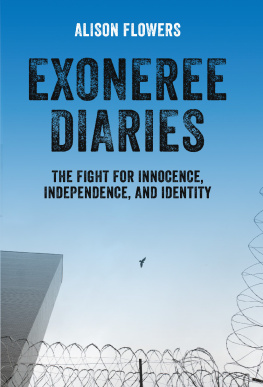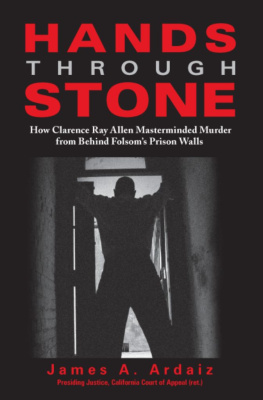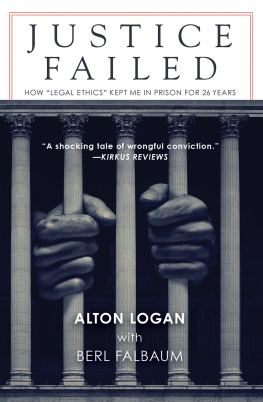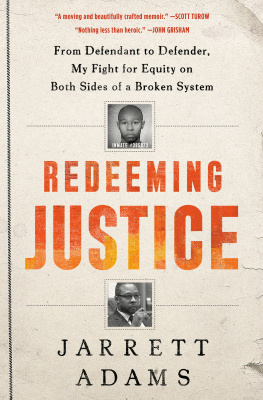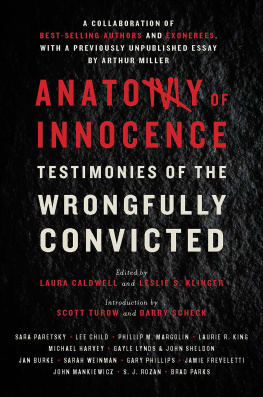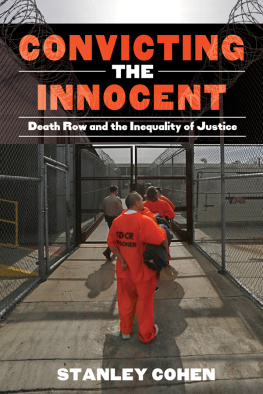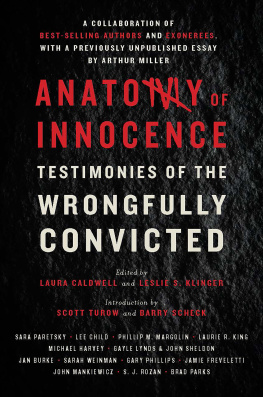Praise for Exoneree Diaries
Having experienced the unending nightmare of being wrongfully convicted, and the mind-blowing trauma that hits like a tidal wave after release from prison, I can attest that Alison Flowers has nailed itand then driven it home. This book will help anyone living with or experiencing profound trauma, and sometimes thats all we can ask for, to have a measure of understanding.
Damien Echols, former West Memphis Three death row inmate and author of Life After Death
Alison Flowerss Exoneree Diaries is a must read, a welcome addition to the literature of wrongful convictions. With Ms. Flowers as our tour guide, we meet four exonereesJacques, Kristine, James, and Antioneand follow them as they begin to rebuild their lives after all the excitement and hoopla of their exonerations has faded. The world they encounter is an alien one, which often treats them with indifference and hostility. But we marvel at their courage as they get busy living and move, sometimes forward and sometimes backward, in both baby steps and giant leaps. Ultimately, Exoneree Diaries is a testament to human resiliency and the power of the human spirit to not only survive but thrive against great odds.
Steven Drizin, lawyer for Brendan Dassey of Making a Murderer and clinical professor of law at Northwestern Pritzker School of Law
At least 2.3 percent of the millions imprisoned in America did not commit the crimes for which they were convicted. Alison Flowers is the rare journalist who does not allow the people treated as collateral damage in the era of mass incarceration to remain invisible.
Spencer Ackerman, US national security editor, the Guardian
Why should we care about the exonerated? From Flint to Florida, the inequities and injustice in our criminal justice system have put America in crisis. The most under-covered and misunderstood aspect: the plight of the exonerated. Alison Flowers has tackled that deficit with keen analysis, investigative savvy, and good old-fashioned shoe leather. Her absorbing portrayals of the exonerated make a potent case for why we should careand actwith compassionate and common-sense policy change.
Laura S. Washington, columnist for the Chicago Sun-Times , political analyst for ABC 7-Chicago
Exoneree Diaries exposes the deeply flawed system that puts so many innocent men and women behind bars, and also reveals the long-lasting trauma that these survivors of our justice system have endured. In the wake of the tragic suicide of beloved exoneree Darryl Hunt, Flowers gives us critical insight into the human beings whom we as a society have wrongfully caged, and leaves us grappling with the questions of how we can better embrace and support them once their innocence has been proven, their release achieved, and their ordeal, in many ways, still just beginning.
Jen Marlowe, author of I Am Troy Davis and The Hour of Sunlight: One Palestinians Journey from Prisoner to Peacemaker
Exoneree Diaries is an immersive and powerful journey through the depths of a violent system. These nuanced, vividly portrayed stories bring to life the heart-wrenching experienceand lingering effectsof having ones freedom stolen by the state. This is a beautifully written and urgently necessary book.
Maya Schenwar, author of Locked Down, Locked Out: Why Prison Doesnt Work and How We Can Do Better
This book is an amazing account about the real experiences of exonerees like me. Alison Flowers captures the cruel absurdity that persists within the criminal justice system.
Kirk Bloodsworth, first death row inmate exonerated by DNA
Alison Flowers has written the definitive book on life after exonerationbeautifully rendered, achingly powerful stories capturing with nuance and depth the perilous leap of faith, hope, and despair that actual freedom requires of the actually innocent. A rare storyteller, indeed.
Pamela Cytrynbaum, executive director of Chicago Innocence Center
No author has covered the years after exoneration with the same depth as Flowers does in this disturbing book. She ably shows that even under the best of circumstances, exonerees struggle with family relationships, job searches, recovery from prison-related health problems, adjustments to new technologies, and more. Exoneree Diaries is a thoroughly researched, provocative book of justice gone wrong.
Kirkus Reviews
Exoneree Diaries is a page-turner about the triumph of courage over Kafkaesque injustices that befell a woman and three men who were imprisoned a total of more than seventy years for crimes they did not commit. The stories of how they survived behind bars and coped with the unrelenting challenges of life after exoneration are at once tragic and upliftingand unforgettable.
Rob Warden, executive director emeritus of the Center on Wrongful Convictions at Northwestern Pritzker School of Law
Alison Flowers has written an important bookfilled with vivid, unforgettable stories. Meticulously told through the perspectives of people who have been exonerated, you feel the stress of watching their tragedies unfold with an eye toward redemption. Their experiences will stay in your mind and heart long past when the last page is finished. There is no substitute for great reporting. These pages represent a measure of justice.
Amy Bach, executive director of Measures for Justice and author of Ordinary Injustice: How America Holds Court
Alison Flowers deserves our kudos for penning this book. May her work signal a paradigm shift in our system of justice. Flowers challenges what most people do not realize: that we have such a tenuous grasp on our liberty. There is a certain disbelief when it comes to wrongful convictionsa belief that our justice system is too good for injustice to happen to anyone, let alone ourselves. Much like Kristine, Jacques, James, and Antione of Exoneree Diaries , I simply could not believe that I could be convicted for something I did not do. During my own trial, I kept thinking the purpose of it all was to find the truth and that the truth would set me free. Instead, when I shared my story of innocence with people, I was told Thats what they all say, or If you didnt do it, you should have. Never have crueler words been uttered to those who suffer conviction unjustly.
Jason Baldwin, one of the wrongfully convicted West Memphis Three
Our criminal justice system is broken. Broken in so many ways and at so many levels and adversely impacting so many millions. Fixing our system depends in the first place on involving and empowering the American people to begin the process of reform. Alison Flowerss timely diaries provide a powerful glimpse into one broken aspect of the system: the wrongly convicted. Flowers sets a moral example for us all. Having encountered injustice she set about educating and enlisting us in her search for answers. Our thanks to Kristine, Jacques, James, and Antione for having the courage to share their stories on behalf of all those who have been denied that opportunity.
US Congressman Danny Davis
In Exoneree Diaries Alison Flowers walks readers through the wrongful convictions of four exonerees, chronicling the unexpected yet multifaceted difficulties theyand all exonereesface upon release. Most people, including the exonerees themselves, expect that once exonerated, they will experience a life of ease, joy, and happiness. But reality quickly sets in: they are released with nothing. Obtaining gainful employment is virtually impossible, and compensation from lawsuits, if any is awarded, can take several years. Exonerees also often have post-traumatic stress disorder and other psychological aftereffects. Its difficult if not impossible to repair familial relationships and other past friendships. Technology and culture have passed them by, leading to a cumulative feeling of no longer fitting into the world. Exoneree Diaries shines light on this hidden reality, while silently raising critically important rhetorical questions: Should society offer reentry services to exonerees, including short-term housing, cost-of-living expenses, mental health services, job training and placement, and other assistance? Or instead continue to release them with nothing, offering less help than parolees receive? Is there a way to expedite the compensation process? Should the states that dont currently offer compensation quickly pass statutes allowing compensation? Should states pass laws designed to prevent wrongful convictions? What can each individual citizen in the United States, and indeed the world, do to fight wrongful convictions? As an exoneree, I urge everyone to learn more about this critical subject by reading this important book.

